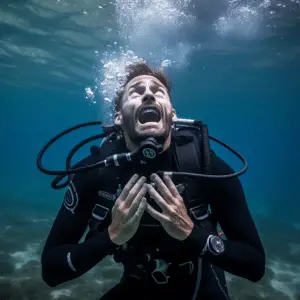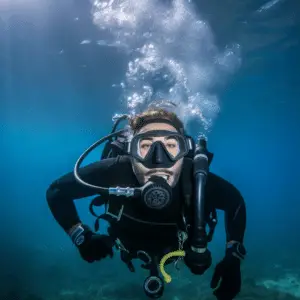Breathholding Techniques for Scuba Diving A good scuba diver needs a few basic abilities to help with maneuverability and water time. Holding your breath for a long time is a good ability since those with reduced lung capacities are more likely to panic. There are many ways to extend the duration you can hold your breath during scuba diving to become a better diver who can spend more time underwater.
Increasing your lung capacity appears impossible, yet small regular exercises can strengthen your resistance to airlessness. I propose seeing a specialist to identify the best way to increase your breath-hold if you are serious about this.
Cardio Training

One of the best ways to gradually increase your ability to hold your breath would be to start increasing the number of cardio exercises you are doing daily. Running and jogging improve health and fitness, affecting breath-holding time. Those who are not as physically fit may struggle with holding their breath as they require more oxygen when doing exercise, this is something that will take time to improve, and it is not going to get better overnight. However, with a strict exercise regime and diet plan, you should begin to see improvements in your ability to hold your breath and your overall health and fitness.
Cardio training is one of the most effective means to improve lung capacity and to prevent rapid fatigue during your dives, your training should be more than just activities to do with diving, and many divers actually overlook the need to do extra forms of exercise that can contribute to helping you in your scuba diving. If you find that you are running out of energy and struggle with holding your breath when you dive, then I would highly recommend that you start looking at ways to lead a healthier lifestyle and gradually increase the amount of exercise you are doing. Scuba diving is heavily reliant on safety. Whether it be remembering to pack your cold water scuba diving gloves or taking the steps towards increasing the time you can hold your breath for, it all contributes to making your scuba diving experiences as positive as they can be.
Specialized Courses and Breath Holding Training
For more dramatic help with holding your breath, consult an industry specialist who can assess your lifestyle and recommend changes to increase lung capacity. Divers benefit from breath-holding training, thus many scuba schools cover it. Many of your dives will require breathing apparatus. There have been several equipment failures, so don’t get comfortable. Divers have saved themselves using their talents. If you need to hold your breath, don’t panic and risk your life or damage. This is so vital that you shouldn’t be hesitant to get professional help. It will be worth it when you can hold your breath longer.
As mentioned previously, it will take time to increase your capacity for holding your breath gradually, so you should look at small breathing exercises that can be implemented into your daily routine. By pushing yourself further and further each time to hold your breath for longer, you should see great improvements in your ability in as little as a few weeks. For those of you who don’t have the time or confidence to consult a professional, there are many online resources on breathing exercise and other fitness routines that can improve lung capacity. There’s no reason not to start right away. Will be glad you did.
Water Temperature
Cold water can impact the body, which is overlooked when breathing underwater. Entering cold water may shock the system. The less experienced diver may panic in cooler conditions, so he needs a good wetsuit to maintain body temperature. The energy needed to stay warm in cold water influences how long you can hold your breath with practice. The cold water will get used to, but there are ways to cope.
Wearing a good wetsuit adds a layer of insulation to the body that helps preserve the warmth. This also helps with what many divers experience when they initially enter the water and reduce the coldness shock. If you want to prevent losing your breath, I recommend that you get into the water at a gradual pace rather than jumping in and going into shock. Take small breaths to help you get through it, and even in the warmest ocean, you should be utilizing these techniques each time you go on a diving trip.
Breathing Equipment

Finally, one of the most effective ways to improve your ability to hold your breath underwater is to ensure that you are using the latest and the best breathing equipment you can find. No matter what your budget is, you should be able to source high-quality oxygen equipment from several sources. Ensuring that you are using the best available equipment is the best way to ensure that your breathing ability underwater is not compromised, and therefore neither is your safety.
